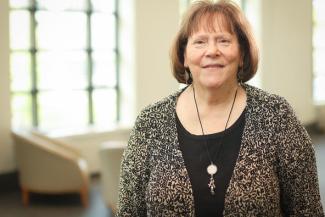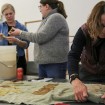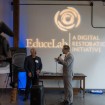Honoring University Research Professor Judith Page

Judith L. Page, Ph.D., an associate professor in the Department of Communication Sciences and Disorders in the University of Kentucky College of Health Sciences, has been named one of 14 University Research Professors.
The 2022-23 University Research Professorship Awards honor faculty members who have demonstrated excellence that addresses scientific, social, cultural and economic challenges in the Commonwealth, across the region and around the world.
Individuals who displayed merit in research and scholarly activity within their area of expertise were nominated based on criteria developed by college leadership. Each University Research Professor receives a one-year award of $10,000.
“I am honored to receive this recognition among many other outstanding individuals at UK,” Page said. “I appreciate that the university fosters and encourages collaborative, interdisciplinary research.”
Page joined UK as faculty in the Department of Communication Sciences and Disorders in 1980. Her primary areas of interest include communication intervention strategies for persons with severe disabilities and augmentative and alternative communication systems. She also focuses on early intervention and interprofessional education and practice.
Page reports that her scholarly efforts are inspired by a statement from the American Speech-Language-Hearing Association about the importance of “making effective communication, a human right, accessible and achievable for all.” Her work in this area has focused on providing education, resources, and support to school-based teams of service providers who serve children with moderate to severe disabilities and complex communication needs and on training future providers to work in interdisciplinary teams to help students with multiple and severe disabilities develop functional communication skills.
School-based practitioners often do not have access to conventional peer-reviewed manuscripts, and report that time is a barrier to gaining knowledge. Consequently, Page’s work with school-based professionals involves knowledge translation, focusing on training and coaching interprofessional teams and on the development and delivery of instructional materials, instructional strategies, and clinical tools that can be used immediately. These activities have resulted in invited and peer-reviewed presentations at state, national and international venues; publications; training manuals; training modules designed for synchronous and asynchronous learning; and continuing education workshops. In recognition of her activities, Page has been invited to speak nationally and internationally and to serve on a committee charged with developing international training standards for speech-language professionals.
During her more than four decades of service, Page has received external support for her scholarly activities via more than $12,850,000 in sponsored grants and contracts.
One of her most recent projects at UK includes serving as principal investigator on an interdisciplinary project with members of the UK College of Education and the Human Development Institute to prepare special educators and speech-language pathologists in creating an effective communication intervention program for students with severe disabilities.
The grant, funded by the U.S. Department of Education, provides 32 scholars tuition support and the educational and practicum experiences necessary to become skilled in providing interdisciplinary, technology-enhanced interventions, in-person or via distance, to K-12 students with significant disabilities in public schools.
“The ability to communicate is essential for learning and for successful participation in life. Unfortunately, many students with severe disabilities enter and leave school with no effective means to communicate, making classroom participation difficult and putting them at risk for poor post-school outcomes,” Page said. “This project seeks to address this problem by helping speech-language pathologists and special educators learn new, creative ways to help these students develop effective communication skills.”
Page received her bachelor's degree from the University of Minnesota, her master's degree from the University of Illinois and her doctorate in audiology and speech sciences from Purdue University. She holds Certificate of Clinical Competence in Speech-Language Pathology (CCC-SLP) from the American Speech-Language-Hearing Association.
In addition to her work at UK, Page has been an active member of various local, state and national organizations, including the American Speech-Language-Hearing Association (ASHA), the Kentucky Speech-Language-Hearing Association (KSHA), the United States Society for Alternative and Augmentative Communication (USSAAC) and the International Association for Logopedics and Phoniatrics (IALP). She served on the Executive Council and as president of KSHA and also as chair of the Kentucky Board of Audiology and Speech-Language Pathology. On the national level, she has served ASHA in several capacities, including chair of the Council on Academic Accreditation in Audiology and Speech-Language Pathology, chair of the Clinical Certification Board, member and/or chair of several committees and most recently president and member of the Board of Directors.
Page is a Fellow of ASHA, a Distinguished Scholar and Fellow of the National Academies of Practice, a recipient of the Honors of KSHA, and a past nominee for the American Speech-Language-Hearing Foundation’s DiCarlo Award for Outstanding Clinical Achievement.


